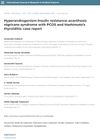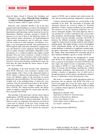 4 citations,
June 2007 in “PubMed”
4 citations,
June 2007 in “PubMed” Effective management of PCOS includes lifestyle changes, medication for menstrual regulation, fertility treatments, and cosmetic issue remedies.
 2 citations,
September 2009 in “Nurse Prescribing”
2 citations,
September 2009 in “Nurse Prescribing” PCOS affects many women, causing various symptoms and health risks, and is managed through lifestyle changes, medication, and support groups.
 1 citations,
January 2022 in “IntechOpen eBooks”
1 citations,
January 2022 in “IntechOpen eBooks” Different PCOS types respond uniquely to infertility treatments, with some having lower pregnancy rates and higher risks of complications.
[object Object]  1 citations,
January 2017 in “International journal of women's health and reproduction sciences”
1 citations,
January 2017 in “International journal of women's health and reproduction sciences” Electroacupuncture improved symptoms of PCOS in a 19-year-old woman.
 1 citations,
October 2013 in “Journal of Postgraduate Medical Institute”
1 citations,
October 2013 in “Journal of Postgraduate Medical Institute” Metformin helps improve menstrual irregularities and some hormone levels in PCOS patients, but not symptoms like excess hair, acne, or hair loss.
 1 citations,
June 2012 in “Springer eBooks”
1 citations,
June 2012 in “Springer eBooks” Acupuncture may improve reproductive and metabolic functions in PCOS without negative side effects, but more research is needed to confirm its effectiveness.
 November 2023 in “International journal of reproduction, contraception, obstetrics and gynecology”
November 2023 in “International journal of reproduction, contraception, obstetrics and gynecology” Polycystic ovary syndrome causes high male hormone levels, leading to symptoms like excess hair, acne, and fertility problems.
 April 2023 in “Elsevier eBooks”
April 2023 in “Elsevier eBooks” PCOS is a hormonal disorder causing symptoms like excess hair, acne, irregular periods, and fertility issues.
 December 2022 in “International journal of preventive, curative & community medicine”
December 2022 in “International journal of preventive, curative & community medicine” PCOS is a common hormonal disorder in women, causing symptoms like acne and irregular periods, and is managed with medication and lifestyle changes.
 December 2021 in “Journal of oncology research reviews & reports”
December 2021 in “Journal of oncology research reviews & reports” Polycystic Ovary Syndrome (PCOS) can lead to diabetes, heart disease, cancer, and mental health problems.
[object Object]  November 2017 in “Elsevier eBooks”
November 2017 in “Elsevier eBooks” PCOS is a genetic disorder affecting women's reproductive health, with treatments focused on symptoms like insulin resistance and fertility.
 October 2023 in “IntechOpen eBooks”
October 2023 in “IntechOpen eBooks” Genes and epigenetic changes are important in the development of Polycystic Ovary Syndrome.

Women with Polycystic Ovary Syndrome (PCOS) have a higher risk of developing type 2 diabetes due to insulin resistance.
 31 citations,
September 2006 in “International journal of gynaecology and obstetrics”
31 citations,
September 2006 in “International journal of gynaecology and obstetrics” New treatments for PCOS focus on insulin resistance and reducing testosterone levels, along with traditional hormone therapies.
 38 citations,
June 2004 in “Human Reproduction”
38 citations,
June 2004 in “Human Reproduction” The document suggests that clinical trials for PCOS should focus on meaningful primary outcomes like live birth rates, rather than less reliable surrogate markers.
 16 citations,
March 2014 in “Journal of the European Academy of Dermatology and Venereology”
16 citations,
March 2014 in “Journal of the European Academy of Dermatology and Venereology” Korean patients with PCOS often have skin problems like acne and excess hair, with different symptoms based on their specific PCOS type.
 January 2024 in “Frontiers in endocrinology”
January 2024 in “Frontiers in endocrinology” Treating early puberty with hormone therapy may increase the risk of polycystic ovary syndrome in adults.
 222 citations,
January 2014 in “International journal of reproductive medicine”
222 citations,
January 2014 in “International journal of reproductive medicine” Insulin resistance and obesity are key factors in the development and worsening of polycystic ovary syndrome, and lifestyle changes are important for managing it.
 1 citations,
December 2021 in “Pakistan biomedical journal”
1 citations,
December 2021 in “Pakistan biomedical journal” Eating certain seeds may help reduce symptoms of Polycystic Ovary Syndrome.

Mohamed Kandil suggests renaming Polycystic Ovary Syndrome to "Polyfollicular Anovulatory Androgenic Syndrome" to better describe its symptoms, but concerns exist that it may not cover all related issues like obesity and depression.
 62 citations,
April 2016 in “Best Practice & Research in Clinical Obstetrics & Gynaecology”
62 citations,
April 2016 in “Best Practice & Research in Clinical Obstetrics & Gynaecology” The conclusion is that there's a need for a new conference to establish stricter guidelines for diagnosing Polycystic Ovary Syndrome (PCOS).
 1 citations,
December 1997 in “Journal of The European Academy of Dermatology and Venereology”
1 citations,
December 1997 in “Journal of The European Academy of Dermatology and Venereology” All women with significant unwanted hair growth have hormonal imbalances, often from polycystic ovary syndrome.
 January 2017 in “Journal of clinical & experimental dermatology research”
January 2017 in “Journal of clinical & experimental dermatology research” The case shows skin changes can indicate deeper health issues like insulin resistance, which are challenging to manage.
 January 2015 in “International Journal of Research in Medical Sciences”
January 2015 in “International Journal of Research in Medical Sciences” A patient with HAIR-AN syndrome, PCOS, and Hashimoto's thyroiditis improved with early diagnosis and treatment to prevent serious health problems.
 January 2006 in “Fertility and Sterility”
January 2006 in “Fertility and Sterility” The book provides a detailed guide on managing Polycystic Ovary Syndrome and is useful for physicians.
 1 citations,
October 2018 in “International Journal of Research in Dermatology”
1 citations,
October 2018 in “International Journal of Research in Dermatology” Most women with excessive hair growth in South India have hirsutism without a known cause, with common facial hair growth and some showing hormonal imbalances and polycystic ovaries.
 67 citations,
September 2008 in “Dermatologic therapy”
67 citations,
September 2008 in “Dermatologic therapy” Hirsutism is excessive hair growth in women often caused by polycystic ovarian syndrome, and identifying the cause is important for managing associated health risks.
 43 citations,
October 2019 in “Pediatric Research”
43 citations,
October 2019 in “Pediatric Research” Lifestyle changes are the main treatment for PCOS, which is a complex condition requiring early management to reduce its health impacts.
 26 citations,
January 2000 in “Hormone research in paediatrics”
26 citations,
January 2000 in “Hormone research in paediatrics” Insulin resistance is linked to high male hormone levels in women, often seen in those with PCOS.
 20 citations,
January 2008 in “Reproductive Biomedicine Online”
20 citations,
January 2008 in “Reproductive Biomedicine Online” Sexual orientation does not affect the prevalence of PCOS or fertility rates in women undergoing artificial donor insemination.






























